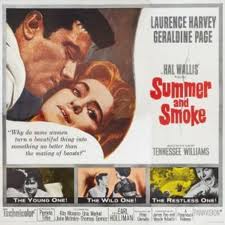You talk as if my body had ceased to exist for you, John, in spite of the fact that you’ve just counted my pulse. Yes, that’s it! You tried to avoid it, but you’ve told me plainly. The tables have turned, yes, the tables have turned with a vengeance! You’ve come around to my old way of thinking and I to yours like two people exchanging a call on each other at the same time, and each one finding the other one gone out, the door locked against him and no one to answer the bell! (Alma, 638)
Summer and Smoke opened in 1948 a year after the author, Tennessee Williams, put out his Pulitzer winning play A Streetcar Named Desire. The play, can be easily overshadowed by its greater sibling, but it remains an interesting effort looking at the difficult of two people incapable of finding love for each other because of the liquid nature of their worldviews. Although a bit troubling, Summer and Smoke is dramatically more liberating than some of Williams’ other plays. The Glass Menagerie suggests how people are unable to escape their condition or their ways of thinking, They are stuck in the past. A Street Car Names Desire suggests the possibility of change but paints a horrific picture of mental decline. Summer and Smoke suggest more benign chances. Alma becomes less coy about her love for John overtime. John starts out the story a bit earthier and open about his desires for Alma, but eventually settles down and become a good boy. So, they fly past each other. I do not want to so easily forgive the social forces at work. Alma begins the play a product of an overly romanticized view of the world, clearly a product of her upbringing and culture. John abandons his sensual origins in the pursuit of a career and a family. Alma outgrew her socialization while John becomes socialized. Alma ends up going her own way by seducing (or accepting the suggestions) of a young man, reversing the situation of the early part of the play.
I suspect many wonderful moments are lost because people pass each other at different places in their life. I am also certain this would be less common and less tragic in a truly free society where people were allowed to be honest and open about their desires, needs, and points of view. Williams knows quite well that culture is horribly oppressive, most importantly to our psychology. Repression of desire (when mostly harmless at least) is one of the greatest possible crimes a culture can impose on individuals.
At the beginning, Alma suggests she is shocked by John’s sexual advances. He is to be a doctor and therefore should be above such lurid interests.
I’m afraid that you I move in different circles. If I wished to be as outspoken as you are, which is sometimes just an excuse for being rude—I might say that I’ve yet to see you in the company of a —well, —reputable young woman. You’ve heard unfavorable talk about me in your circle of acquaintances and I’ve heard equally unpleasant things about you in mine. And the pity of it is that you are preparing to be a doctor. You’re intending to practice your father’s profession here in Glorious Hill. . . But you have a gift for scientific research! You have a chance to serve humanity. (587)
Notice the moralism and class assumptions that invade that statement. It was probably lectures like this, given by many people through his life that convinced him to reform himself and settle down. Alma may, in the end, have regretted giving that lecture to him.
All in all, a play that should not be ignored for those interested in the relationship between sexual freedom and culture.

